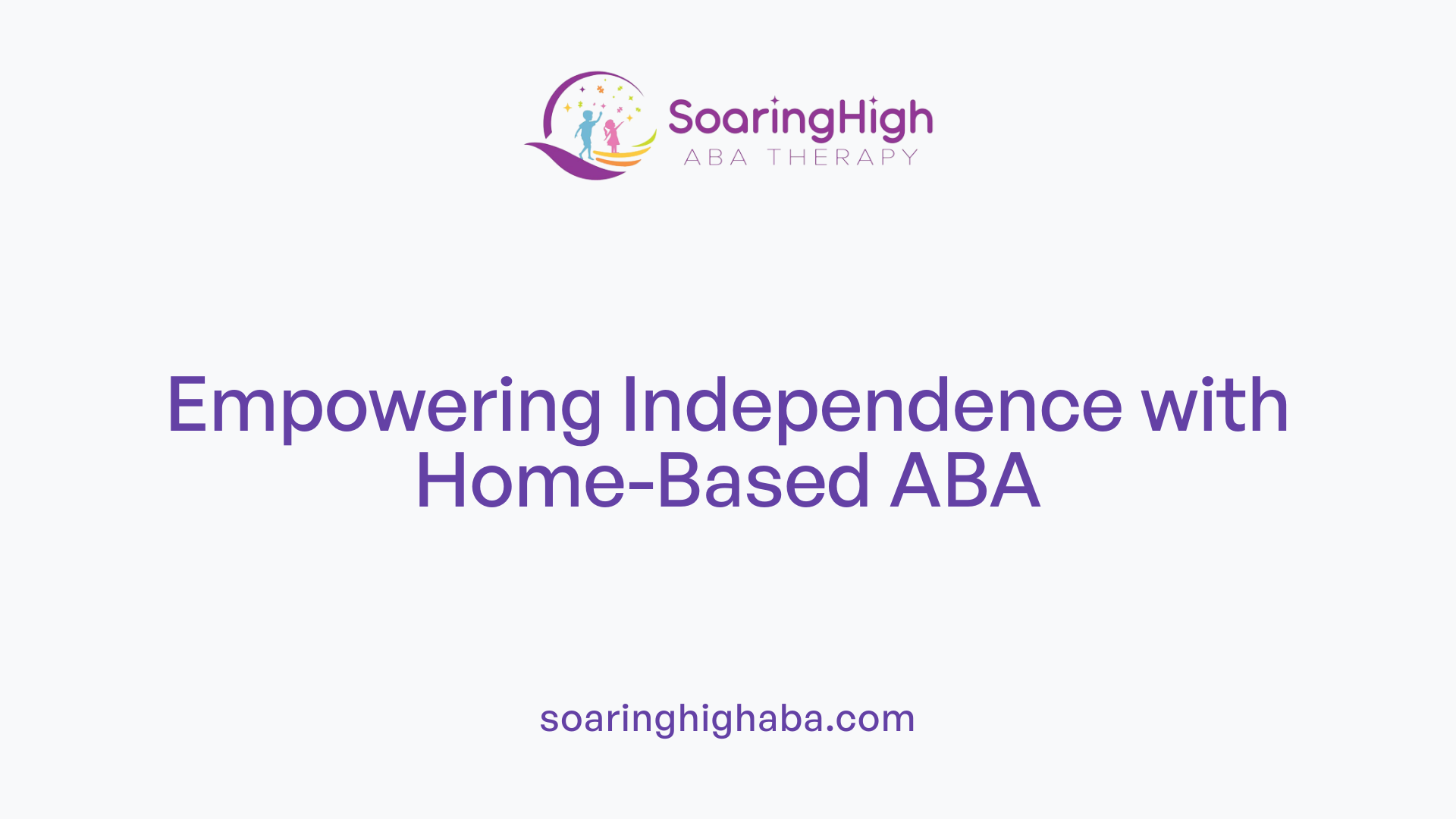Unlocking Long-Term Growth and Self-Sufficiency for Children with Autism
Home-based Applied Behavior Analysis (ABA) therapy is revolutionizing how children with autism and other developmental conditions achieve independence and personal growth. By creating personalized, natural environments for intervention, this approach offers lasting benefits that extend well into adolescence and adulthood. This article explores how home-based ABA promotes essential skills, improves developmental outcomes, and supports lifelong autonomy, emphasizing the importance of family involvement, individualized plans, and evidence-based strategies.
The Rising Demand for Home-Based ABA Therapy
 The demand for Applied Behavior Analysis (ABA) therapy has been rapidly increasing in recent years. This growth is primarily driven by a higher prevalence of autism spectrum disorder (ASD), making more children and families seek effective interventions. As awareness about autism and related behavioral conditions spreads, more parents and caregivers are recognizing the benefits of early and consistent therapy.
The demand for Applied Behavior Analysis (ABA) therapy has been rapidly increasing in recent years. This growth is primarily driven by a higher prevalence of autism spectrum disorder (ASD), making more children and families seek effective interventions. As awareness about autism and related behavioral conditions spreads, more parents and caregivers are recognizing the benefits of early and consistent therapy.
Public advocacy and education campaigns have played a crucial role in highlighting the importance of ABA. These efforts have not only informed families but also influenced policy changes that lead to better insurance coverage for behavioral health services. Advances in technology, such as telehealth, have further enhanced access to ABA therapy, allowing providers to reach individuals in remote or underserved areas.
Beyond autism, ABA’s applications are expanding to other conditions like ADHD, OCD, and anxiety disorders. This broader scope increases the market size and the availability of tailored interventions for diverse needs. The industry has seen a surge in trained professionals, including Board Certified Behavior Analysts (BCBAs) and assistant behavior analysts, although the demand still exceeds supply.
Who benefits most? Children and adults with autism, as well as those with related behavioral challenges, gain from these services. The individualized, home-based nature of ABA promotes meaningful progress through tailored interventions that suit each person's unique needs. As the field continues to grow, more families are gaining access to effective treatments that foster independence, social skills, and emotional regulation.
Why Home-Based ABA Surpasses Center-Based in Long-Term Development

Is home-based ABA therapy more effective than center-based therapy for long-term development?
Home-based ABA therapy often provides a more impactful approach for fostering long-term growth in children. One of its main advantages is the ability to practice and generalize skills within a familiar environment. This natural setting helps children feel less anxious, actively engaging them in real-life situations, which encourages meaningful learning.
In addition to environment, personalized treatment plans are easier to implement at home. Therapists can craft interventions that specifically cater to each child's unique needs and family dynamics, making the therapy more relevant and effective.
Family involvement plays a crucial role in reinforcing skills learned during sessions. Active participation by parents or caregivers ensures consistent practice outside of therapy hours, further promoting independence and confidence.
Another benefit is the opportunity for children to apply new skills directly in their daily routines, such as communicating with family members, managing self-care tasks, or engaging with peers. This real-world practice is key to developing lasting abilities.
Flexible scheduling and ongoing supervision are additional strengths of home-based ABA. Families can plan sessions around their routines, maintaining continuity and ensuring the intervention adapts as the child progresses. This consistency helps sustain progress over the long term.
Compared to center-based programs, where children might struggle with unfamiliar surroundings or have limited opportunities to practice skills in everyday contexts, home-based ABA creates a supportive, familiar environment. This setting fosters genuine responses and consistent application of skills, leading to more durable developmental gains.
In summary, the environment, tailored interventions, family engagement, and adaptable scheduling collectively make home-based ABA therapy a highly effective strategy for supporting children’s ongoing development. These factors facilitate the generalization of skills into everyday life, contributing significantly to their independence, social skills, and overall quality of life.
The Impact of Home-Based ABA on Developmental Outcomes and Capabilities
What positive effects does home-based ABA therapy have on a child's long-term development and capabilities?
Home-based ABA therapy offers numerous benefits that significantly support a child's growth and skills development over time. By delivering tailored interventions within the familiar environment of the home, children often feel more relaxed and secure, which encourages active participation and engagement in learning activities.
One of the primary advantages is the improvement in communication and social skills. Techniques such as task analysis and Natural Environment Teaching help children learn how to express themselves, understand social cues, and interact with peers effectively. These skills foster meaningful relationships and contribute to social competence.
In addition, ABA supports increased independence and self-regulation. Children learn practical daily skills like self-care routines, managing emotions, and calming strategies. These abilities help children handle stress better and become more autonomous, boosting their confidence and resilience.
Another vital focus is on building real-world skills that children can apply outside therapy sessions. Skills related to daily living activities, social engagement, and community participation are emphasized to promote lasting competence. Active involvement of family members during therapy enables consistent reinforcement and generalization of these skills to different settings.
The personalized, flexible nature of home-based ABA allows for ongoing monitoring and adjustments, ensuring that interventions remain relevant and effective as the child develops. Moreover, the reduced need for travel and minimized health risks make this approach sustainable and accessible for many families.
Overall, home-based ABA therapy fosters long-term improvements through tailored strategies that enhance communication, social skills, independence, and emotional regulation. These gains contribute to a better quality of life, empowering children with the confidence and skills necessary for greater participation in everyday activities and community life.
Long-Term Advantages of Consistent Home-Based ABA Intervention

What are the long-term benefits of home-based ABA therapy?
Consistent ABA therapy at home can have lasting positive effects on a child's development. One of the primary advantages is the sustained improvement in language and communication skills. Children learn to express their needs and engage more effectively with others, which enhances their ability to participate socially.
In addition to communication, behavioral improvements are significant. ABA helps reduce maladaptive and challenging behaviors, creating a more conducive environment for learning and growth. This decrease in problematic behaviors supports children in gaining greater independence and confidence.
Daily living skills are another focus of long-term ABA intervention. Children become more capable of managing self-care activities, routines, and social interactions, which are crucial elements of adaptive functioning.
Furthermore, early and regular ABA therapy promotes enduring skills that help children transition into adolescence and adulthood more smoothly. Research shows that these interventions lead to improvements in intelligence, attention, and academic performance that persist over time.
The lifelong benefits of ABA include better social integration, increased independence, and an overall improved quality of life. These outcomes empower individuals to participate actively in their communities, pursue education or employment, and develop meaningful relationships.
| Long-Term Benefits | Focus Area | Description |
|---|---|---|
| Sustained language and communication | Language Skills | Enhances the ability to express needs, socialize, and participate in conversations |
| Reduction of maladaptive behaviors | Behavior Management | Minimizes problematic actions that hinder learning and socialization |
| Improved daily living skills | Independence Skills | Builds routines for self-care, self-regulation, and daily tasks |
| Enhanced social and adaptive skills | Social Engagement | Fosters peer interactions and community participation |
These benefits demonstrate the importance of early, consistent home-based ABA therapy, which can support lifelong development and improved societal participation.
Developmental Gains and Lifespan Outcomes Linked to ABA Therapy

What developmental outcomes are associated with long-term use of ABA therapy?
Long-term ABA therapy is recognized for producing significant improvements across various developmental areas. Children undergoing sustained, intensive programs—often 25 to 40 hours weekly for one to three years—tend to show meaningful progress in language, social skills, and behavioral regulation.
One of the most notable benefits is enhanced communication ability. Children learn to express their needs more effectively, both verbally and nonverbally. This improvement supports better social interactions and helps reduce frustration that may stem from communication challenges.
Social skills also see substantial growth, with children developing better ways to interact with peers and adults. Techniques like task analysis and Natural Environment Teaching encourage spontaneous social engagement, building friendships and cooperative behaviors.
Cognitive and academic development is another important outcome. As attention, focus, memory, and problem-solving skills improve, children often perform better in school and other learning settings. These gains contribute to increased independence in daily activities.
Behavioral challenges, such as tantrums or disruptive actions, frequently diminish with ongoing ABA interventions. Functional assessments identify triggers, and tailored strategies help manage or replace problematic behaviors, fostering a more positive environment.
Importantly, the advantages of ABA extend beyond childhood. Early intervention—especially before age four—can significantly reduce developmental delays and support lifelong benefits. The skills acquired through intervention promote not only immediate progress but also long-term independence, community participation, and an improved quality of life.
By focusing on individualized plans and continuous evaluation, ABA therapy equips individuals with essential life skills, ensuring they can navigate social, educational, and personal domains confidently into adulthood.
| Developmental Domain | Typical Benefits | Long-Term Impact |
|---|---|---|
| Language and Communication | Enhanced expressive and receptive language | Improved social and professional interactions over lifespan |
| Social Skills | Better peer interactions and relationship building | Sustained ability to develop meaningful relationships |
| Behavioral Regulation | Reduced problematic behaviors and emotional outbursts | Increased self-control and emotional resilience |
| Cognitive and Academic | Improved focus, memory, and learning skills | Greater independence and success in education and work |
| Daily Living Skills | Skills for self-care and routine independence | Continued autonomy and participation in community life |
In sum, long-term ABA therapy fosters a broad spectrum of developmental gains that support individuals throughout their lives. These improvements underpin greater independence, social integration, and overall well-being, demonstrating the lasting value of early, tailored intervention.
Promoting Independence and Empowerment Through ABA Strategies

How does home-based ABA therapy promote independence in children with autism?
Home-based ABA therapy plays a vital role in helping children with autism develop the skills needed for greater independence. One of its primary benefits is its personalized approach, where interventions are tailored to each child's unique needs, focusing on areas like communication, daily routines, and social interactions.
Therapists use evidence-based techniques such as Discrete Trial Training (DTT), Pivotal Response Training (PRT), and functional communication training. These methods teach children to express their needs effectively, engage in social exchanges, and navigate daily tasks more autonomously.
The natural environment of the home allows for consistent practice and reinforcement of skills in real-life settings. Children learn to apply what they’ve learned outside therapy sessions, which helps in generalizing behaviors to other places like school or community areas.
Family involvement is crucial. When parents and caregivers participate actively in therapy, they can reinforce learned skills, provide ongoing support, and create routines that promote independence.
Overall, home-based ABA strategies foster crucial life skills. These include communication, self-care, social participation, and problem-solving, which collectively support children in becoming more autonomous. The systematic, compassionate approach of ABA empowers children with autism to develop confidence, participate actively in their communities, and lead more independent lives.
Fostering a Future of Autonomy and Growth
Long-term home-based ABA therapy stands as a cornerstone for empowering children with autism and supportively guiding their developmental journey. The individualized, family-centered, and natural environment-based approach not only accelerates skill acquisition but ensures these skills are retained and generalized across multiple settings. As children grow, the foundational abilities cultivated through consistent, tailored interventions lead to greater independence, social integration, and quality of life. Emphasizing ongoing collaboration among therapists, families, and educational providers, home-based ABA continues to demonstrate remarkable potential in shaping resilient, autonomous individuals prepared to thrive in their communities.
References
- Home-Based ABA Therapy: Personalized Benefits for Autism
- The Benefits of ABA Therapy in Home and School ...
- 7 Key Benefits of At Home ABA Therapy You Should Know
- Impact of an Applied Behavior Therapist: ABA Techniques
- Applied Behavior Analysis (ABA)
- ABA Therapy Age Limits & Age Range Based on Evidence
- Articles & Insights on ABA Therapy & Child Development
- Comprehensive ABA-based interventions in the treatment of ...





































































































